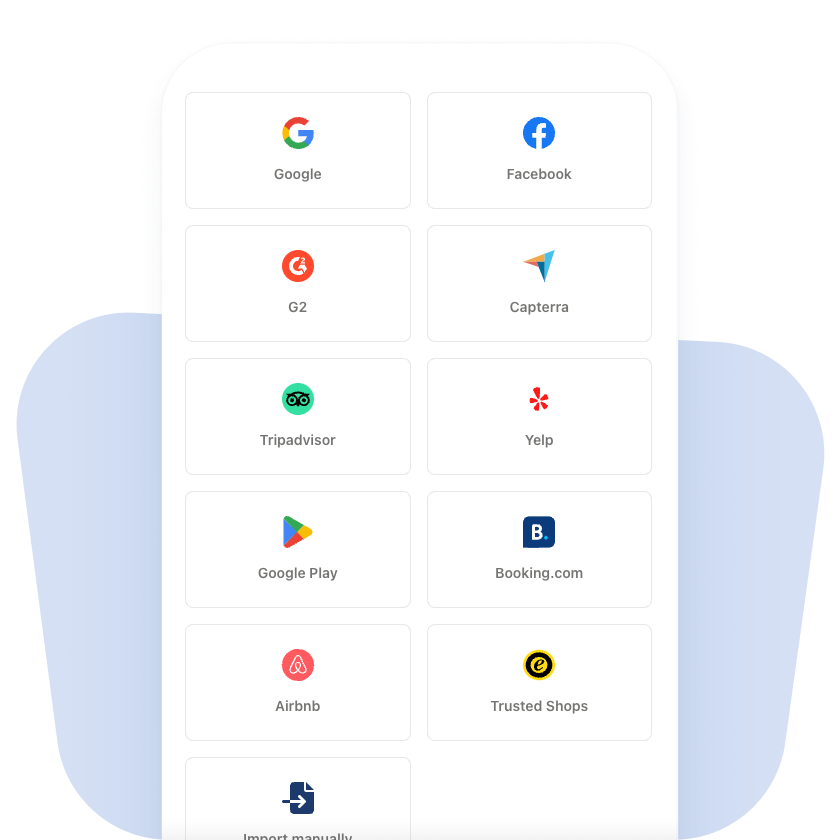Improve Online Reputation with Review Management Software


Looking to boost your business’s online image? Review management software can help you monitor and respond to customer reviews across multiple platforms, maintain a positive reputation, and attract more customers.
Let's explore how these tools work and compare 10 top solutions.
Why Customer Review Management Matters
Managing customer reviews effectively is crucial for any business. It shapes your reputation and online presence. Review management software helps gather and respond to feedback, enhancing the customer experience and building trust.
These tools offer features like sentiment analysis which focuses on analyzing the emotions your customers experience while interacting with you, a more general review analysis, and reporting dashboards, which help businesses monitor trends and insights to improve products or services.
This leads to higher customer satisfaction, increased sales, and better search engine rankings.
Promptly handling negative feedback is also essential, as it demonstrates a commitment to customer satisfaction and strengthens your brand's reputation.
Get a CSAT software to automate this process completely.
Benefits of Review Management Software
Implementing review management software offers numerous advantages for businesses. Here are some key benefits:
1. Enhanced Online Reputation
Review management software helps maintain a positive online reputation by monitoring and responding to customer reviews. Timely responses to feedback demonstrate that your business values customer opinions, fostering trust and loyalty.
2. Increased Customer Engagement
Engaging with customers through reviews shows that you care about their experiences. This boosts customer satisfaction and encourages repeat business. Features like social sharing amplify positive reviews, reaching a broader audience.
3. Improved Search Engine Rankings
Positive reviews and high customer ratings can improve your search engine rankings. Review management software helps gather more reviews and ensures they are optimized for SEO, increasing your business's visibility online.
4. Valuable Insights and Analytics
Review management platforms offer tools like sentiment analysis and reporting dashboards. These provide valuable insights into customer opinions and trends, allowing you to make data-driven decisions to enhance your products or services.
5. Efficient Negative Feedback Management
Promptly addressing negative reviews is crucial for maintaining a good reputation. Review management software alerts you to negative feedback, enabling quick responses and resolutions. This proactive approach can turn dissatisfied customers into loyal advocates.
6. Streamlined Review Collection
Automating review requests simplifies the process of collecting customer feedback. This increases the volume of reviews, providing a more comprehensive view of customer satisfaction and areas for improvement.
7. Enhanced Customer Trust
Consistently managing and showcasing reviews builds customer trust. Potential customers are more likely to choose your business if they see that others have had positive experiences.
8. Competitive Advantage
In a crowded market, a strong online reputation sets you apart from competitors. Review management software helps highlight your strengths and positive customer experiences, giving you an edge.
9. Cost-Effective Marketing
Leveraging positive reviews through social sharing and review badges serves as cost-effective marketing. Happy customers become brand advocates, promoting your business through word-of-mouth.
10. Better Customer Service
By monitoring and responding to reviews, you can identify common customer issues and improve your service. This ongoing feedback loop helps ensure your business continually meets customer expectations.
How to Choose the Right Review Management Platform
Selecting the right review management platform can significantly impact your business's online reputation and customer engagement. Here are some key factors to consider when making your choice:
1. Features and Capabilities
Look for platforms that offer comprehensive features, such as:
- Review Badge Management: Display positive reviews on your website.
- Review Requests: Easily request reviews from customers via email or text.
- Social Sharing: Share positive feedback on social media to boost visibility.
- Sentiment Analysis: Understand customer feelings and identify trends.
- Reporting Dashboards: Access detailed reports to track performance and insights.
2. Integration
Ensure the platform integrates seamlessly with your existing systems, such as your CRM, email marketing tools, and social media channels. This will help streamline operations and improve efficiency.
3. Ease of Use
The platform should be user-friendly and intuitive. A simple interface can save time and reduce the learning curve for your team.
4. Customer Support
Good customer support is crucial. Look for platforms that offer multiple support options, such as live chat, email, and phone support. This ensures you can get help when you need it.
5. Pricing
Consider your budget and the pricing plans offered by the platform. Entry-level options might be suitable for small businesses, while larger enterprises may require more advanced features. Evaluate the cost-benefit ratio to ensure you get the most value for your investment.
6. Scalability
Choose a platform that can grow with your business. As your company expands, you’ll need a solution that can handle an increasing volume of reviews and offer additional features to support your growth.
7. Security
Ensure the platform has robust security measures in place to protect your data and customer information. Look for features like data encryption and compliance with industry standards.
8. Customization
A good review management platform should offer customization options to match your branding and specific needs. This includes custom review request templates, personalized notifications, and adaptable reporting tools.
9. Trial Periods and Demos
Take advantage of free trials or demos to test the platform before committing. This allows you to evaluate its features, usability, and overall fit for your business needs.
By considering these factors, you can select a review management platform that aligns with your business goals, enhances customer satisfaction, and strengthens your online reputation.
Top 10 Review Management Software
1. Trustmary
Trustmary offers features like
- Review management
- Review requests
- Social sharing, and
- Review widgets
- Customer sentiment analysis with AI
It helps businesses monitor feedback on various platforms, improving their online reputation and customer experience. Trustmary's affordable pricing makes it ideal for local businesses and SaaS companies. You can add all reviews from SaaS review sites to your website – and even from Google.
You can forget Google reviews badge, and use an all-in-one review widget to feature reviews from all sources.

2. Birdeye
Birdeye helps businesses manage customer reviews on social media and online directories. It offers features like review badge management, review requests, and social sharing. Sentiment analysis and reporting dashboards provide insights on customer feedback, helping improve online visibility and brand reputation.
3. Brand24
Brand24 is great for monitoring and responding to reviews across multiple platforms. It offers sentiment analysis and social listening to keep businesses updated on customer trends and insights. Features like review badge management, review requests, and social sharing support word-of-mouth marketing and trust-building.
4. ReviewTrackers
ReviewTrackers simplifies review management with features like review badge management, review requests, and social sharing. It provides sentiment analysis and insights to improve customer satisfaction and brand reputation. The reporting dashboard helps monitor online presence and track customer trends.
5. Podium
Podium assists businesses in handling reviews from social media and directories. It offers review badge management, review requests, and social sharing to enhance brand reputation and customer satisfaction. Sentiment analysis and notification alerts for negative feedback help maintain a positive online presence.
6. Yotpo
Yotpo stands out with features like review requests, social sharing, and review badge management. It offers sentiment analysis, reporting dashboards, and social listening to track customer trends and enhance engagement and trust. Suitable for both entry-level businesses and larger enterprises.
7. ReviewFlowz
ReviewFlowz helps businesses manage customer reviews across platforms. It offers review badge management, review requests, social sharing, and sentiment analysis. The reporting dashboard provides insights into customer trends and campaign management, boosting online visibility and search engine ranking.
8. Grade.us
Grade.us provides comprehensive review management with features like review badge management, review requests, and social sharing. Sentiment analysis and social listening help respond to feedback promptly. The platform includes a reporting dashboard for tracking online reputation and customer trends.
9. TrustIndex
TrustIndex helps businesses measure customer trust and satisfaction from reviews. It uses sentiment analysis and social listening to maintain a positive online reputation. Review badge management and social sharing boost online visibility and search engine ranking.
10. Reviews.io
Reviews.io allows businesses to collect and display customer reviews and respond quickly on various platforms.
Features like sentiment analysis, reporting dashboards, review badge management, and review requests make it easy to monitor online reputation and engage with customers.
Review Management Software vs Online Reputation Management Software
Review management software focuses on handling customer reviews, collecting feedback, and promoting positive reviews to improve customer engagement and search engine rankings.
In contrast, ORM software has a broader scope, monitoring brand mentions across the internet, managing crises, and providing tools for content marketing and competitor analysis.
While review management software is ideal for small to medium-sized businesses and industries reliant on customer feedback, ORM software suits large enterprises and those needing comprehensive brand reputation management.
Both offer customer sentiment analysis, but ORM software covers a wider range of brand mentions.
Using both types of software can provide a holistic approach to managing online presence and reputation.
Start Your Review Management Journey for Free
You can begin your review management journey for free by trying out Trustmary.
With no time limitation, you can explore Trustmary's review collection, management, and showcasing capabilities.
FAQs: Review Management Platforms
What is a review management platform?
A review management platform is a tool that helps businesses handle customer reviews on platforms like social media and directories. It monitors feedback, tracks trends, and analyzes sentiment to improve online reputation and customer satisfaction.
Can I manage reviews on all platforms with a single tool?
Yes, features like review badge management, review requests, and social sharing in review management software help respond to reviews across various platforms. This enhances customer satisfaction and brand reputation.
Why is review management important for businesses?
Review management helps maintain a positive online reputation by monitoring and responding to customer feedback. This builds trust and loyalty, improves online visibility, and increases sales.
How does review management software work?
It monitors and collects reviews from different platforms and includes features like review badge management, review requests, and social sharing. Tools for sentiment analysis and reporting dashboards assist in analyzing and responding to reviews effectively.
Can review management software help with SEO?
Doing great review management for SEO can boost search engine rankings by increasing online visibility through positive reviews and customer engagement. Features like review requests and media monitoring enhance your online presence.
How do I choose the right review management software for my business?
Consider features like review badge management, social sharing, sentiment analysis, and integration with existing systems. Look for software with robust features, reliable customer support, and affordable pricing options.
Can review management software generate reviews automatically?
Yes, it can send review requests via email or text to collect feedback. However, maintaining a balance between automated reviews and authentic feedback is essential to preserve trust and credibility.
Is it possible to manage negative reviews effectively?
Yes, features like sentiment analysis, social listening, and reporting dashboards help track and respond to negative feedback, turning it into positive outcomes and enhancing your online reputation.
Is review management software costly?
Pricing varies based on features and functionalities. Entry-level packages offer basic features, while higher tiers provide advanced capabilities. The investment is worth it for improved online visibility, customer engagement, and brand reputation.
How can I measure the success of using review management software?
Track increases in positive reviews, monitor key metrics like customer engagement and online visibility, and gauge ROI through improved sales and customer satisfaction. Use reporting dashboards to analyze trends and gather insights for informed decision-making.